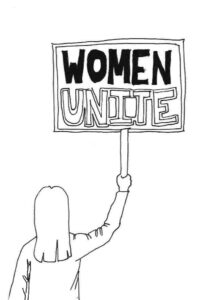
“The feminist agenda is not about equal rights for women.” television evangelist, Pat Robertson, said in a 1992 fundraising letter, “It is about a socialist, anti-family political movement that encourages women to leave their husbands, kill their children, practice witchcraft, destroy capitalism and become lesbians.” The letter, distributed to the supporters of the Christian Capital Coalition, was in opposition of the proposed equal rights amendment to the state of Iowa’s Constitution. (The amendment was voted down.)
How in the world did Robertson develop this extremist and insulting opinion of proactive women?
His list of characteristics in association with feminism is a result of the “angry feminist” stereotype.
In the U.S., the stereotype of the angry feminist was popularized by anti-suffragists in the 1920s. Anti-suffrage posters depicted angry and overpowering women with protruding teeth and generationally unattractive figures. Images bore captions of women, “angry feminists,” neglecting their children and abusing their husbands.
Though the terms are used interchangeably, feminist and “angry feminist” are wildly different. By using them interchangeably, as Robertson did, the real purpose of the feminist movement is ignored, and demonized as evil, destructive and a danger to America.
When negative characteristics are assigned to female feminists in association with the term angry, their frustration over issues such as equal pay, familial partnership and the #MeToo movement, is invalidated. When anti-feminists discuss feminism using the term anger, they are talking about the characteristics they have associated with the cartoonist stereotype of the angry feminist, such as man-hating and family-abandoning.
Feminist and activist, Roxanne Gay, told Guy Raz during an interview on the TED Radio Hour that when she was young, she had absorbed the wild misapprehension and slurs about feminists. “I had strange ideas about feminists as hairy, angry, man-hating, sex-hating women.”
Due to the biased and selective representation of women in the media, women growing up may not be exposed to positive models of themselves or to the information they need to create a robust, capable, vital and independent life. To lead this independent life, women would develop characteristics such as strength and force of mind that are generally only praised in men.
The American female ideal was represented as dainty, submissive, loving, maternal and quiet. These characteristics were considered desirable which enabled the so-called “end goal” of any woman’s life — a good marriage and a family.
Some still view this restrictive standard for women as underlying American society. Laura Goode, a professor of Women’s Studies at Stanford, said of society’s expectations of women, “Getting married is (seen as) the most important thing for a woman being of interest to a man.”
This single definition of success and femininity stunts girls’ curiosity and ambition. Simple, single definitions need to be interrogated. Other possibilities need to be explored. As Kate Wiley, Dean of Students, History teacher and former adviser of LWOW said, “I think in many ways when you only have one news source, you’re not encouraged to interrogate anything. You don’t even know what you could ask for.”
The intent of the stereotype “is to implant fear in young women,” said Goode, “If they are too strong, if they are too smart, if they are too assertive, then (they are told) they’ll die without romance and love.” By sparking fear early in girls’ lives, this stereotype spreads the exact message it intended — deter young women from believing in women’s equality and vitality, in the tenets of feminism — and additionally, in themselves.
Wiley explained her experiences with the stereotype as a girl. “My brothers came up with a nickname for me that was meant to be teasing but it has stuck through all of my life. They used to call me Susie like Susan B. Anthony. It was a response to my wanting to advocate, to be able to do the things I saw my brothers doing and to be treated the same.” With her brothers’ teasing words about her activist mindset in mind, Wiley said it “ended up making me fight harder.”
These seemingly small moments have lasting effects. “I internalized at a young age that the response I was going to get (to speaking out) most often was going to be this stereotype to silence me so that others didn’t have to actually think about the things I was asking for,” said Wiley.
Men intimidate girls by calling them names using the “angry feminist” stereotypes. They are threatened by the feminist movement, and their so-called “reduction of power” that comes with equaling out the playing fields. The “angry feminist” stereotype is a direct retaliation to women’s attempt to defy the gender norms in society created by the men who benefit from them.
As Goode points out, because men have been culturally dominant for so long, it is easy for them to be “self-centered” and not recognize women’s frustration at being second class citizens.
The stereotype is a response to women striving for a sense of belonging that men have forever been entitled to. “Power makes you (men) feel like you (men) belong everywhere,” said Roxanne Gay in the interview with Guy Raz.
Women have every right to be angry. “It’s diabolical to give women so many reasons to be angry and then say that the one emotion you must never feel for fear of scaring the man is this anger you have every justification for feeling,” said Goode.
“What if you are just angry? Why can’t I be angry, this is stuff that is validly upsetting.” said Joelle Perry, a senior at Temecula Valley High School.
For women of color, especially Black women, a strained relationship with anger is created due to the intersectionality of race and gender. Both identifiers are not permitted, by the dominant society, to express anger, adding layers to “angry feminist” stereotype for BIPOC female feminists. “Black women frankly have better reasons to be angry than anybody in America,” said Goode, and yet “it (the ‘angry feminist’ trope) limits their ability to express that anger in any sort of productive or proactive way.”
If men are permitted to express their emotions productively, so should women. Women have had to live through history written by men on a daily basis. They experience men’s expression in all forms of anger, and men get away with without repercussions.
Women deserve to have and articulate their own valid anger.







